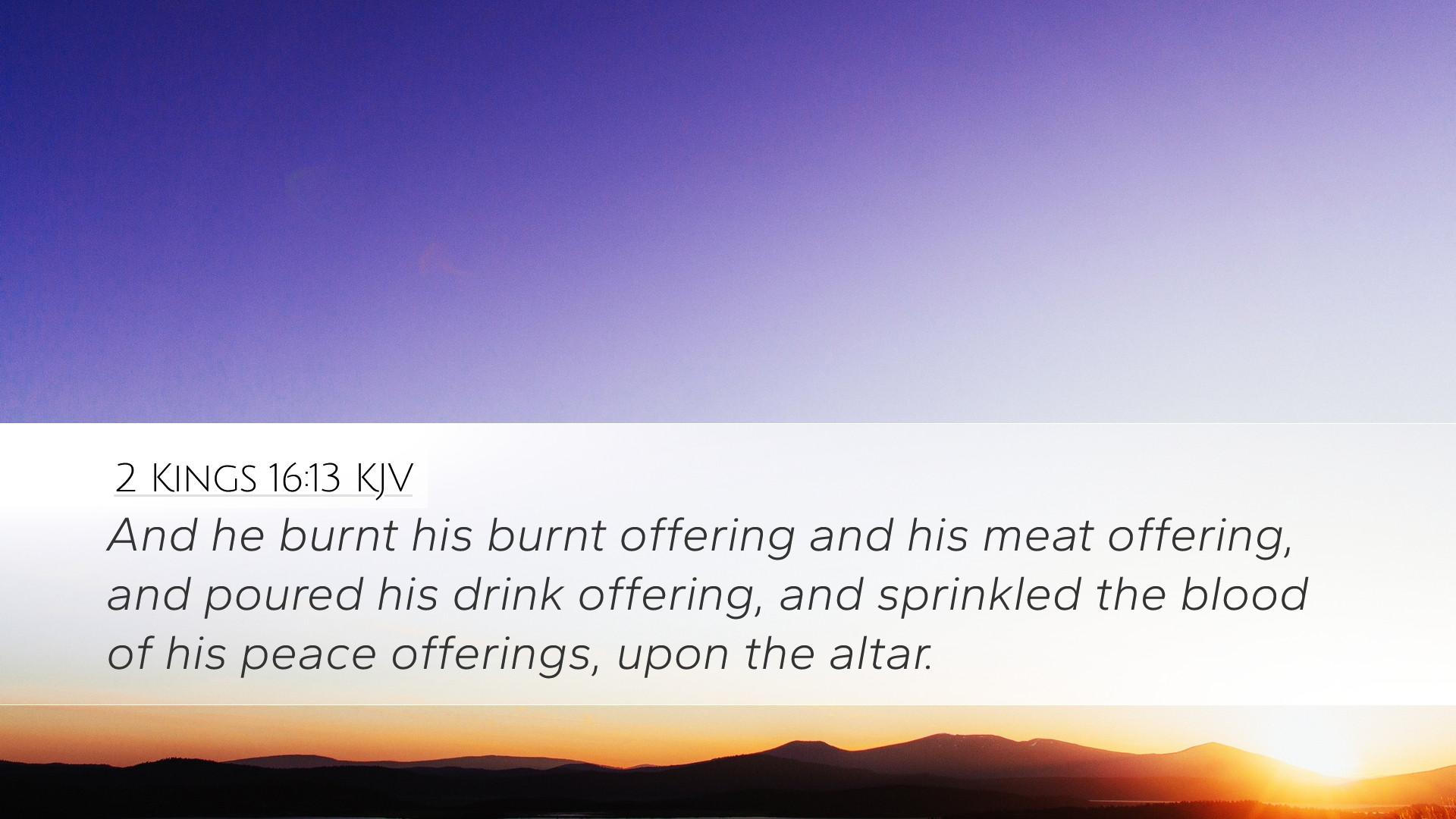Old Testament
Genesis Exodus Leviticus Numbers Deuteronomy Joshua Judges Ruth 1 Samuel 2 Samuel 1 Kings 2 Kings 1 Chronicles 2 Chronicles Ezra Nehemiah Esther Job Psalms Proverbs Ecclesiastes Song of Solomon Isaiah Jeremiah Lamentations Ezekiel Daniel Hosea Joel Amos Obadiah Jonah Micah Nahum Habakkuk Zephaniah Haggai Zechariah Malachi2 Kings 16:13
2 Kings 16:13 KJV
And he burnt his burnt offering and his meat offering, and poured his drink offering, and sprinkled the blood of his peace offerings, upon the altar.
2 Kings 16:13 Bible Commentary
Commentary on 2 Kings 16:13
Verse Context: 2 Kings 16:13 records the actions of King Ahaz of Judah regarding his approach to worship and sacrificing to God. This passage reflects the spiritual condition of Judah during a tumultuous period.
Text of 2 Kings 16:13
"And he burnt his burnt offering and his meat offering, and poured his drink offering, and sprinkled the blood of his peace offerings, upon the altar."
Commentary Overview
This commentary seeks to unpack the significance of Ahaz's actions in 2 Kings 16:13 and the implications of his choices for the people of Judah. Various public domain commentaries shed light on the theological, historical, and moral dimensions of this passage.
Historical Context
Matthew Henry notes that Ahaz was a king noted for his departure from the worship of Yahweh and his adoption of practices from surrounding nations, particularly those of the Assyrians. This context is critical for understanding his sacrificial acts, as they were not aimed at honoring God but rather influenced by a desire for political gain.
Albert Barnes emphasizes the broader socio-political landscape during Ahaz's reign. Ahaz faced significant pressure from Israel and Syria, which ultimately led him to seek assistance from Tiglath-Pileser of Assyria. This alliance influenced his worship practices, as he adopted pagan elements that were thought to secure military favor.
The Nature of Ahaz's Offerings
The verse's details about burnt offerings, meat offerings, and drink offerings reflect the prescribed sacrificial system in the Mosaic Law. However, Adam Clarke points out that Ahaz's motivations were corrupt—as he sought to please the gods of the Assyrians rather than Yahweh. His sacrifices were devoid of genuine devotion and were in direct contradiction to the covenantal expectations of the Jewish people.
This notion raises important discussions on the nature of worship: Matthew Henry highlights that external acts of worship, like sacrifices, can be meaningless if they are not paired with a true heart of repentance and fidelity toward God.
Theological Implications
- Divine Judgment: There is a significant theme of judgment tied to Ahaz's actions. His reliance on foreign powers rather than trust in God often leads to divine discipline.
- Worship in Spirit and Truth: The requirement for a true heart in worship is emphasized throughout scripture, and Ahaz's actions serve as a stark reminder of the dangers of ritualism without relationship.
- Conflict Between Faith and Politics: Ahaz exemplifies the tension that can exist when political strategies overshadow spiritual commitments, a relevant consideration for contemporary believers.
Moral Lessons
The narrative surrounding 2 Kings 16 contrasts the heart of true worship with that of a misguided king. Valuable lessons can be drawn, especially for leaders and the faithful:
- Authenticity in Worship: As today’s spiritual leaders, it is imperative to approach God with sincerity, striving to align practices with genuine faith despite external pressures.
- Discernment Against Cultural Pressures: Like Ahaz, modern believers face influences that may lead them away from the core truths of the faith; hence the importance of discernment in worship practices.
- The Call for Repentance: The dangers of turning to worldly solutions must spur believers toward repentance and a return to biblical fidelity.
Conclusion
2 Kings 16:13 serves as a sober reminder of the profound implications that arise from a compromised faith. It compels pastors, students, theologians, and Bible scholars to reflect on the authenticity of their worship and the importance of maintaining a holy covenant with God amidst societal pressures. As articulated in the insights of Henry, Barnes, and Clarke, the integrity of worship must be rooted in truth rather than convenience. Therefore, let this verse resonate in our hearts as a call to strive for true devotion in our walk with God.


